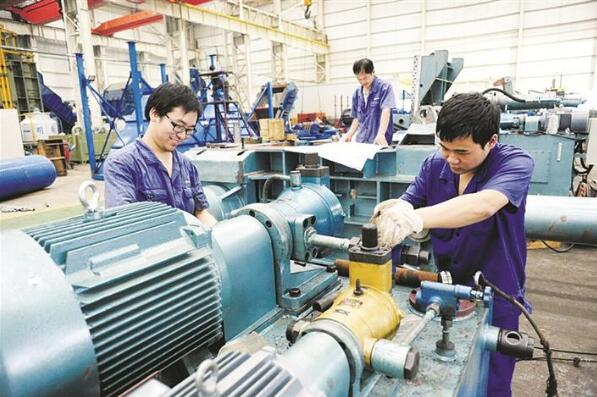Hubei Lidi: Expert in Scrap Steel "Packaging"
Release time:
2019-05-08

Photographed by Li Jing, Correspondent of Three Gorges Daily
In Yichang, Hubei Lidi Machine Tool Co., Ltd. has a high reputation and reputation. Its predecessor was Yichang Machine Tool Factory established in 1969. In the field of metal recycling equipment, Lidi Company has been exploring for 50 years, from the packaging machine to the first gantry shear, and then to the first domestic scrap steel crushing line. Lidi Company has always led the development direction of China's scrap steel processing equipment, becoming a renowned equipment manufacturing and research and development enterprise in the renewable resources industry.
Observing the History of Enterprise Changes and Seeing the Track of Advancing with the Times
In 1969, Wuzhong Technical School relocated to Yichang and established Yichang Machine Tool Factory with Yichang Maintenance Station, producing surface grinders and lathes. At the beginning of the reform and opening up, the Machine Tool Factory and Yichang First Machinery Factory merged to establish the "Yichang Machine Tool Industry Company". It was commissioned by the State Administration of Materials and Materials to produce scrap car recycling equipment, mainly packaging machines and crocodile type scrap steel cutting machines. In the era of planned economy, "Yichang Machine Tool" has become a shining business card of the mechanical industry in the province.
By relying on products to establish a stable market position, the company has successfully developed three types of packaging machines: YD81-100, 160, and 250, as well as 160 ton crocodile type scrap steel cutting machines and cylinder crusher. In 1986, the company successfully produced China's first Q91Y series gantry shearing machine and was selected by the Ministry of Machinery as one of the first pilot enterprises for technological progress.
In 1996, it was confirmed by the Provincial Commission for Restructuring and Reform to be a state-owned holding joint-stock enterprise established through fundraising, and renamed as "Hubei Lidi Machine Tool Co., Ltd.". At that time, the company passed the ISO9000 quality system certification and also obtained the FMRC quality system certification in the United States, becoming the first enterprise in the industry to pass the certification in one go.
In 2006, in response to the wave of reform, Lidi implemented a private restructuring, and all 40 million shares of the original state-owned enterprise were withdrawn, achieving the development goals of "government transfer of property rights, employee transformation, and enterprise transformation mechanism". Private shareholders established Yichang Lidi Environmental Protection Technology Group Co., Ltd. to hold Hubei Lidi Machine Tool Co., Ltd. In 2013, all of the company's equity was transferred to Jiangsu Tianqi Group, bringing the company's development to a new level and injecting new vitality. In 2016, it was awarded the title of "Excellent Equipment Supplier for Scrap Vehicle Recycling and Disassembly in China" by the China Material Recycling Association.
After years of baptism, Lidi has developed into a large modern enterprise that focuses on the development and production of metal recycling machinery and environmental protection equipment, integrating scientific research, development, manufacturing, operation, and foreign trade. The company's main product, scrap steel recycling machinery, has a market share of 75% in the domestic market, and currently has 5 professional chemical factories, ranking first in the industry.
Leading the way with innovation and winning the market with quality
As a 50 year old enterprise, Lidi is still active at the forefront of the industry, not relying on luck, but on strong innovation capabilities and excellent product quality, "said Li Mingbo, General Manager of Hubei Lidi Machine Tool Co., Ltd. Li Di's every transformation closely follows the pulse of the times, relying on advanced technology, strong research and development capabilities, sharp vision, and mature management concepts to build the enterprise into a leader in the industry.
For many years, the company has continuously increased investment in the research and development of new products to maintain its competitiveness in the market. In 2008, we successively developed China's first PSX-80104 scrap steel crushing production line and the first Y81-1000 metal hydraulic packaging machine. Wuhan University of Technology and Three Gorges University graduate workstations have been listed in the company, greatly enhancing the company's research and development capabilities. In 2016, the research project on key technologies for recycling, dismantling, and resource utilization of retired passenger vehicles, which was undertaken by the Ministry of Science and Technology under the "863" plan, passed the acceptance smoothly.
In order to cope with the unfavorable situation of product supply and demand slowdown, low-level fluctuations in upstream and downstream prices, intensified competition for meager profits, and forced exit of weak positions in the international and Chinese metal markets, Lidi Company vigorously expands its business scope and accelerates transformation. In addition to adhering to the scrap steel processing industry, in the first half of 2015 alone, multiple project teams were introduced, including waste plastic rubber processing equipment, urban and kitchen waste processing and treatment, high-end crushers, etc., expanding the industrial chain and entering the field of environmental protection equipment.
At present, Lidi Company provides equipment, application solutions, and supporting services for users in five major sectors: scrap steel processing, automobile disassembly, non-ferrous metal processing and sorting, comprehensive utilization of renewable resources, and environmental protection and energy conservation. Our products are exported to Southeast Asia, Europe, Africa and other places, and we have established good cooperative relationships with customers from countries and regions such as France, the United States, and Russia.
Stabilizing the domestic market and seeking global success, extending the enterprise industry chain
Since 2016, stimulated by a package of stable growth policies, the domestic steel market has gradually recovered.
In order to achieve leapfrog development in the renewable resources industry, Lidi has partnered with Tianqi Group to build an automated assembly line for automobile disassembly, providing one-stop services from factory design to capacity planning, equipment selection and installation, as well as financing, joint ventures, and mortgage guarantees.
Lidi also utilizes a platform with timely and efficient network services to remotely diagnose and maintain equipment, and to achieve big data integration with customers. In order to create a Chinese brand in the field of resource recycling and comprehensive utilization equipment, go abroad, and enter the international market, Lidi Company has opened its official website with four language services: Chinese, English, Russian, and Arabic. It has also joined international organizations such as the Middle East Recycling Bureau (BMR) and the American Waste Recycling Association (ISRI), strengthening cooperation in overseas markets.
Li Di's short-term goal is to leverage the high-quality platform of Tianqi Group to become one of the largest suppliers of automotive disassembly equipment in China in the shortest possible time. "Speaking of future development, Li Mingbo is ambitious:" Relying on its own technology and product advantages, expanding product coverage, extending the industrial chain, actively participating in global industrial chain cooperation and competition, and becoming a world-class equipment manufacturing and service provider
Related Cases



 No. 42050202000596
No. 42050202000596
